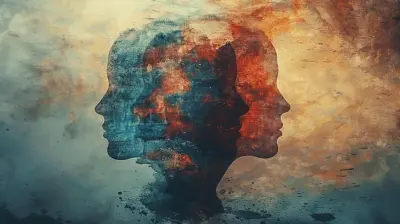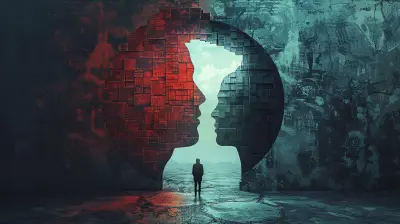The Role of Fear in Cultural Norms and Traditions
31 October 2025
Let’s face it — fear has been running the show behind the scenes way more than we care to admit. It’s the puppet master of cultural norms, the silent force that shapes our traditions, and the sneaky little voice that tells us “Do that, or else…” Whether you're afraid of disappointing grandma by skipping a holiday ritual or terrified of being judged for breaking some “unspoken” rule, friend, you've been under fear's thumb.
So what's the deal with fear having such a VIP pass to our cultural values? Buckle up, because we’re diving deep into the murky waters of how fear influences — and sometimes outright controls — the way we do things as societies. Spoiler alert: it’s not all doom and gloom. Sometimes, fear keeps us safe. Sometimes, it keeps us in check. But yeah, sometimes it just makes us act ridiculous. Let’s break it down, sass and all.

What Even Is Fear, Anyway?
Before we blame fear for all our cultural weirdness, let’s get chummy with it.Fear is a survival instinct. It’s what kept our ancestors alive when they were tiptoeing around saber-toothed tigers. It's our brain’s alarm system saying, “Yo, that's dangerous. Stay away!” But here’s the twist — as we evolved, fear went from protecting us from wild animals to protecting us from social rejection, shame, or punishment.
Now, fear isn’t about literal death — it’s more about the death of acceptance, which in social psychology land is still a pretty big deal.

Fear + Culture = A Match Made in Psychological Manipulation Heaven
Culture is like a collective personality. It tells us what’s “right” and “wrong,” what’s expected, what’s praised, and what’s punished. But culture didn’t just wake up one day and say, “These are the rules.” Nope. Many cultural norms and traditions were baked in fear — fear of the unknown, of outsiders, of divine punishment, of chaos, of communal collapse.Enter: Generational Fear
Remember that one “tradition” your family insists on that no one can explain? "That's how it's always been," they say. Translation? "We’re too scared to stop doing it just in case something bad happens."This is generational fear — anxiety passed down like a family heirloom. You’re not just following a rule; you’re avoiding the wrath of ancestors who may (or may not) be judging your every move from the afterlife.

Cultural Norms: Fear’s Favorite Playground
Cultural norms are the unspoken rules of society. They're the “don’ts” that everyone just knows. But who wrote the rulebook? And why are we so damn committed to them?1. Fear of Social Rejection
Let’s be real — humans are pack animals. We crave connection, belonging, validation. And cultural norms? They keep the pack in check. But how? FEAR. Step out of line, and boom — you're the weirdo, the outcast, the black sheep.Want proof?
- Someone decides not to get married in a culture where marriage is everything? Judgment parade incoming.
- Choose a non-traditional job path in a status-obsessed culture? Let the whispers begin.
- Ditch an outdated religious custom? Cue the dramatic gasps.
We follow norms not because we always believe in them, but because we're terrified of what happens if we don't.
2. Fear of Divine Retribution
Religious and spiritual traditions often come with rules. And those rules? Often tied tightly to fear.Think about it:
- Step one toe out of line, and the gods might smite you (or your crops, or your love life).
- Didn’t offer incense to the ancestors? Hope you’re not into good fortune.
- Ate the “wrong” food on the “wrong” day? Better start praying.
These aren’t just beliefs; these are systems built on the idea that bad things will happen if you don’t follow the script. Divine justice is a powerful motivator — but it’s also a fear-based one.
3. Fear of the "Other"
One of fear’s slickest moves? Making people terrified of what they don’t understand. Enter xenophobia — discrimination, suspicion, and hostility toward outsiders. Cultures develop norms and traditions not just to bond their members, but to keep “others” out. Why? Because the unfamiliar is scary.This fear creates a cultural bubble where everyone inside speaks the same language, follows the same taboos, and wears the same metaphorical armor — all to protect against perceived threats from the outside.
Not cute, but super common.

Traditions: Fear Wrapped in Festivity
Ahh, traditions. Those sweet little customs—weddings, birthdays, rites of passage—that seem so wholesome on the surface. But scratch that surface, and guess what you’ll often find?Yup. Fear.
Weddings: “Do It Right or Else”
In so many cultures, weddings aren't just about love — they’re about status, reputation, and doing things “the right way.” Heaven forbid a bride wears the wrong dress or a couple skips a ritual. What would people say?!It's not always about belief. It's about fear of judgment. Fear of dishonor. Fear of breaking something sacred and... unleashing some cosmic consequence.
Coming-of-Age Rituals: Fear in a Fancy Costume
Many cultures have intense initiation rituals to mark the transition from child to adult. Often, they’re painful, emotionally taxing, or even life-threatening. But they're not just about transformation — they’re about proving you're not afraid.The logic? If we can condition you to fear us more than the outside world, you'll behave. Boom. Culture wins again.
But Wait — Isn’t Fear Sometimes Actually... Useful?
Okay, let’s not demonize fear entirely. Credit where it’s due — fear has done a decent job keeping societies from turning into complete chaos. Here’s how:- Encouraging morality: Fear of punishment (social, legal, or spiritual) keeps most people from stealing, lying, or harming others.
- Creating order: Fear-driven norms can generate stability. Everyone knows their roles, follows the calendar, and respects boundaries.
- Protecting traditions: Fear helps preserve cultural identity in a world that's constantly changing and threatening to erase what makes groups unique.
So yeah, fear can be a controlling jerk, but sometimes you want a jerk that’s good at their job.
Modern Culture: Fear’s Makeover
In today’s world, fear has taken on some pretty impressive disguises. It’s not always about mythical punishments or tribal taboos. Now, it’s about:- Fear of not being successful
- Fear of missing out (FOMO)
- Fear of being “canceled”
- Fear of being irrelevant
Social media has taken fear and turned it into a 24/7 performance pressure cooker. So even though we might not fear ancient curses, we definitely fear going viral for the wrong reasons.
Can We Break the Cycle?
Good news — we’re not fear’s prisoners forever. Here’s the first step to breaking the cycle: awareness. Yep, just being conscious of how fear shapes behavior is powerful. Start asking questions like:- “Do I believe in this tradition, or am I scared of not following it?”
- “Is this cultural expectation fair or just fear-based control?”
- “What would I do differently if I wasn’t afraid?”
Once you start asking the big-feeling questions, you’ll see how many decisions are fear-based. And from there, you can consciously — and bravely — choose your own path.
Let’s be clear: rejecting fear-based traditions doesn’t mean disrespecting culture. It means making space for cultural values that are rooted in love, celebration, and connection — not guilt, shame, or anxiety.
Final Thoughts: Is Fear the Villain or the Architect?
Here’s the plot twist: fear isn’t all bad. It’s not just the villain lurking in your cultural closet — it’s also the architect that helped build your identity, your belonging, and your connections. The goal isn’t to destroy fear, but to recognize where it helps and where it hurts.Fear sneaks into every corner of cultural life — from what we wear, to whom we marry, to how we grieve, worship, or celebrate. But the next time you find yourself doing something just because “that’s what we do,” pause and ask — is this about values or is this about fear?
You might be surprised by the answer.
all images in this post were generated using AI tools
Category:
Psychology Of FearAuthor:

Nina Reilly
Discussion
rate this article
1 comments
Mitchell Carrillo
This article compellingly highlights how fear shapes cultural norms, illustrating its dual role as a unifying force and a means of social control. However, it could further explore the psychological implications for individuals who resist these norms, highlighting potential paths for empowerment.
November 3, 2025 at 4:55 AM

Nina Reilly
Thank you for your insightful comment! I appreciate your suggestion to explore the psychological implications for those who resist norms. I’ll definitely consider expanding on empowerment in future discussions.


